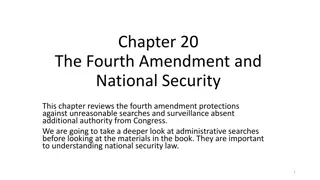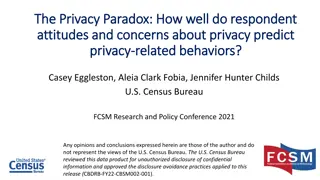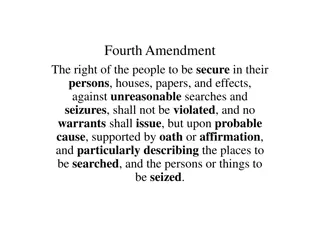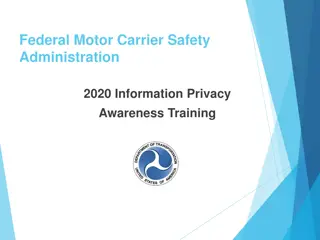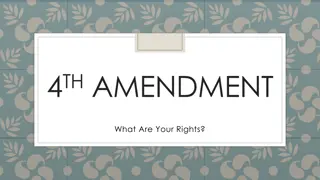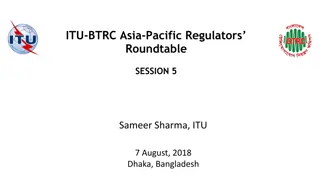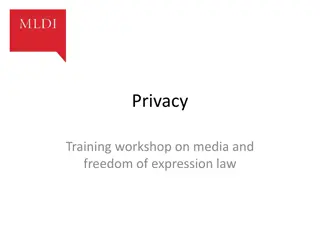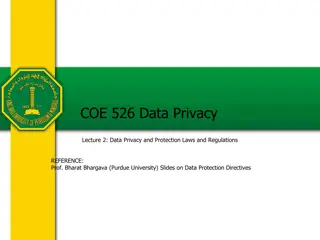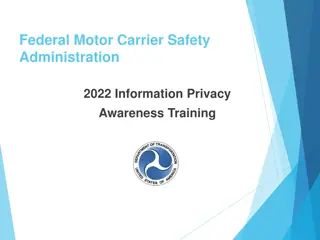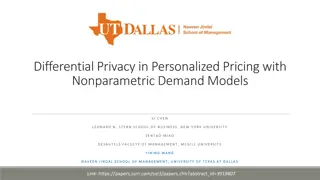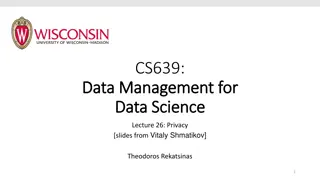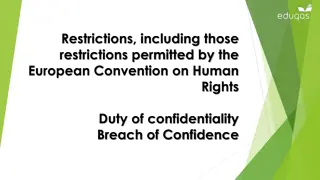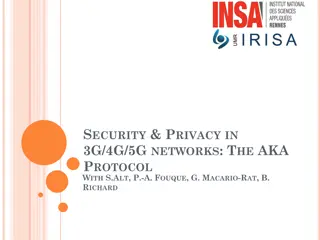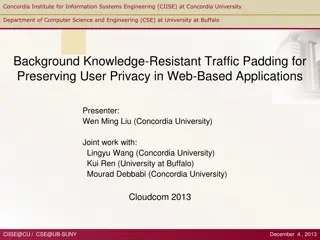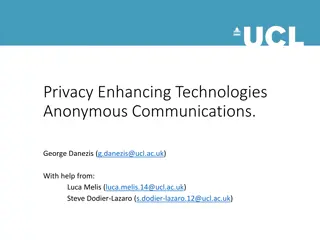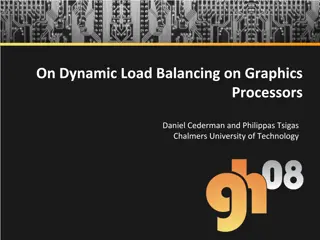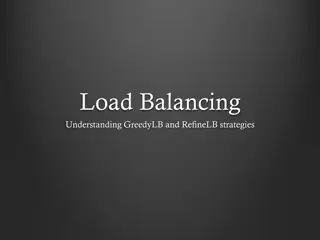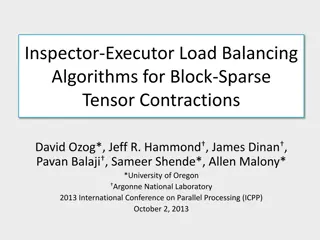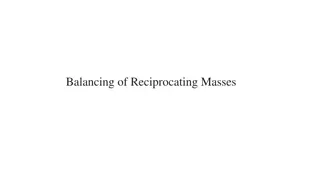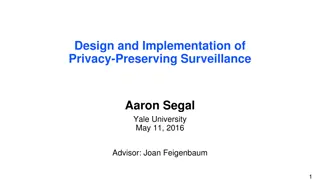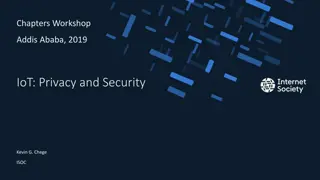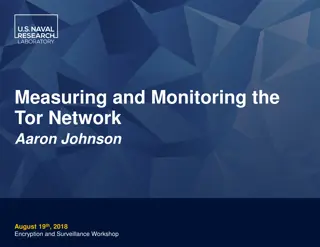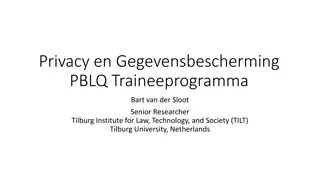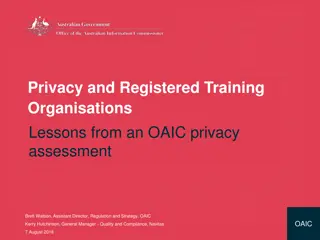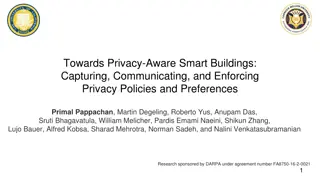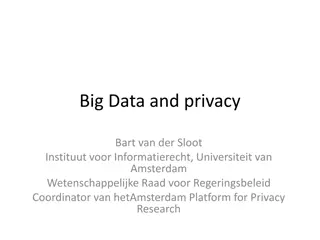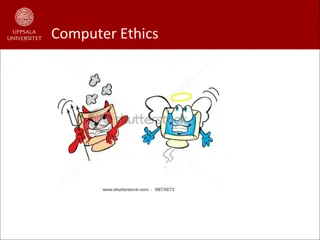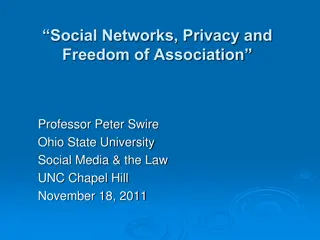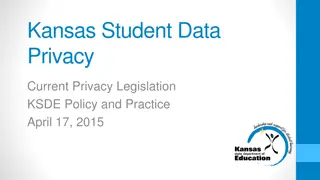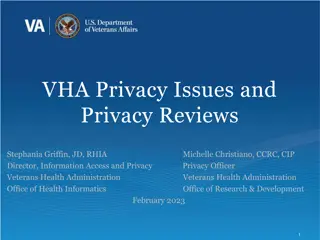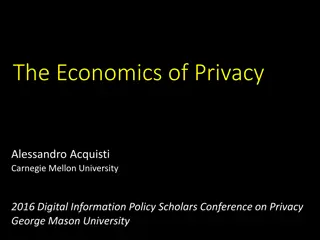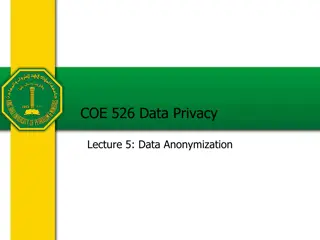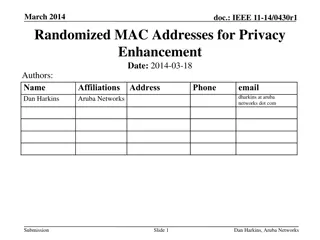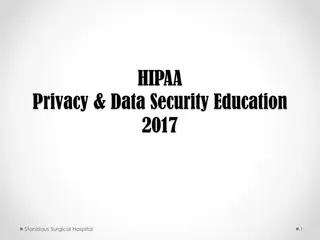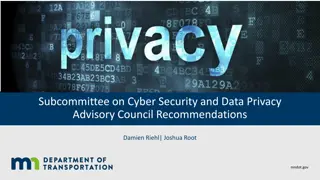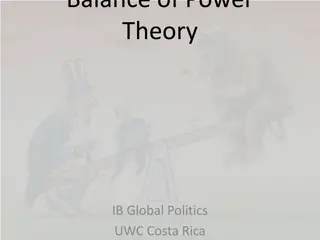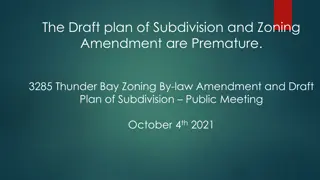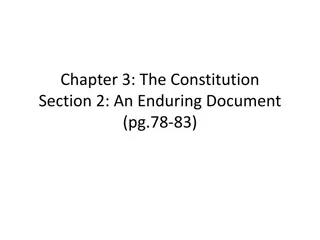The Fourth Amendment: Balancing Privacy and Security
This chapter delves into how the Fourth Amendment safeguards against unreasonable searches and surveillance, exploring landmark cases like Katz v. United States. It discusses exceptions to warrant requirements, such as plain view and special circumstances searches, and special needs searches that don't require probable cause warrants. The chapter sets the stage for understanding the intersection of national security statutes and individual privacy rights.
Download Presentation

Please find below an Image/Link to download the presentation.
The content on the website is provided AS IS for your information and personal use only. It may not be sold, licensed, or shared on other websites without obtaining consent from the author. Download presentation by click this link. If you encounter any issues during the download, it is possible that the publisher has removed the file from their server.
E N D
Presentation Transcript
Chapter 20 - The Fourth Amendment and National Security This chapter reviews the fourth amendment protections against unreasonable searches and surveillance absent additional authority from Congress. In future chapters we will see how this law is modified by specific national security statutes and the judicially created 3rdparty rule.
Katz v. United States, 389 U.S. 347 (1967) [One of the Warren Court expansions of criminal due process rights.] The court found that defendant had a reasonable expectation of privacy when in a phone booth making a phone call. (The booth was bugged, not the phone.) This established that the 4thAmendment was not tied to trespass on the defendant's property. Judge Harlan s concurrence introduces the notion of a reasonable expectation of privacy as the test for whether a given situation is protected by the 4thAmendment.
Criminal Law Exceptions to Warrant Requirements Plain View The plain view exception recognizes that you have no reasonable expectation of privacy for what you do in public view. In Katz the phone booth was in public view and hearing but once inside there was an expectation of privacy. Things done inside a private house, but visible through a window from public property are in plain view. The courts wrestle with technical tools, such as telescopes, infrared sensors, long-distance microphones, and satellite imaging, that expand the notion of plain view.
Criminal Law Exceptions to Warrant Requirements Special Circumstances Searches incident to arrest, United States v. Robinson, 414 U.S. 218 (1973) Automobile searches, Michigan v. Long, 463 U.S. 1032 (1983) Hot pursuit or exigent circumstance searches, Michigan v. Tyler, 436 U.S. 499 (1978) Stop and frisk searches, Terry v. Ohio, 392 U.S. 1 (1968).
Criminal Law Exceptions to Warrant Requirements Special Places Searches of persons and things entering and leaving the United States, United States v. Montoya de Hernandez, 473 U.S. 531 (1985) Searches of boats on navigable waters, United States v. Villamonte-Marquez, 462 U.S. 579 (1983) Searches of airplanes, United States v. Nigro, 727 F.2d 100 (6th Cir. 1984) (en banc).
Special Needs Searches (Administrative Searches) These do not need a probable cause warrant. searches to prevent railroad accidents that cause great human loss, Skinner, 489 U.S. at 628; searches to help prevent the spread of disease or contamination during a public health crisis, routine public health searches, Camara v. Municipal Court, 387 U.S. 523 (1967); sobriety checkpoints, Mich. Dept. of State Police v. Sitz, 496 U.S. 444 (1990); checkpoint searches designed to adduce evidence of criminal activity by individuals other than the vehicles occupants, Illinois v. Lidster, 540 U.S. 419 (2004).
Olmstead v. United States, 277 U.S. 468 (1928) How did you make phone class in those days? Was there an expectation of privacy? Were phone lines all private? How might this have influenced the court? Did this court apply the 4th amendment to wiretaps?
Federal Communications Act of 1934 Makes it a crime for any person to intercept and divulge or publish the contents of wire and radio communications. Did the court apply this to federal agents? Yes, and excluded wiretap evidence obtained without a warrant. (Nardone v.United States) How did DOJ interpret this? They could wiretap, just couldn t use it for evidence. How would you know if they wiretapped your client if they do not introduce the evidence? This is the fatal flaw of the exclusionary rule as a privacy protection.
The Extent of Katz v. United States, 389 U.S. 347 (1967) Remember that the Communications Act of 1934 had already limited wiretapping and prevented its introduction into evidence if done without a warrant. The Katz Court went beyond wiretapping and found that the fourth amendment protected against searches, even if there was no trespass.
Katz and Administrative Searches Katz is the same term as Camara and See. All three of these decisions strengthen the individual s expectation of privacy. The administrative search cases now require a general/area warrant. The criminal search requires a proper fourth amendment warrant for electronic eavesdropping even in a public place, if the defendant has a reasonable expectation of privacy. What changes in the connected world is whether you have given up your reasonable expectation of privacy.
The Flexibility of Reasonable Suspicion in Justifying a Search or Warrant What about a search prompted by nothing more than an anonymous tip of a planned bombing? [In one case the Supreme Court remarked that] it did not need to speculate about the circumstances under which the danger alleged in an anonymous tip might be so great as to justify a search even without a showing of reliability. We do not say, for example, that a report of a person carrying a bomb need bear the indicia reliability we demand for a report of a person carrying a firearm before the police can constitutionally conduct a frisk.
Omnibus Crime Control and Safe Streets Act (1968) Response to Katz Title III established a procedure for the judicial authorization of electronic surveillance for the investigation and prevention of specified types of serious crimes and the use of the product of such surveillance in court proceedings. It prohibited wiretapping and electronic surveillance by persons other than duly authorized law enforcement officers, personnel of the Federal Communications Commission, or communication common carriers monitoring communications in the normal course of their employment. Title III, however, disclaimed any intention of legislating in the national security area.
A Domestic National Security Exception?
US v US District Court (Keith), 407 US 297 (1972)
What is the underlying crime? Criminal trial of suspects who bombed a CIA office in Ann Arbor. What was a CIA office doing in Ann Arbor, MI? Was there foreign involvement? The case did not involve any allegations of foreign involvement, it was just domestic groups.
How was the evidence gathered? Warrantless Wiretaps How were the wiretaps authorized? The affidavit also stated that the Attorney General approved the wiretaps to gather intelligence information deemed necessary to protect the nation from attempts of domestic organizations to attack and subvert the existing structure of the Government.
Did the Omnibus Crime Control Bill control? What language excluded this sort of crime? Nor shall anything contained in this chapter be deemed to limit the constitutional power of the President to take such measures as he deems necessary to protect the United States against the overthrow of the Government by force or other unlawful means, or against any other clear and present danger to the structure or existence of the Government. Having found that the crime bill did not control, the court must look to the Constitution for standards.
What Does the Government Argue this National Security Exemption Means? It argues that in excepting national security surveillances from the Act s warrant requirement Congress recognized the President s authority to conduct such surveillances without prior judicial approval. What is the real question before the court Whether safeguards other than prior authorization by a magistrate would satisfy the Fourth Amendment in a situation involving the national security. . . . Key fact this crime had happened and the perpetrators were in custody. How does the situation change when you are concerned about future attacks?
Does This Court See Exceptions Consuming the 4th Amendment? It is true that there have been some exceptions to the warrant requirement. But those exceptions are few in number and carefully delineated; in general, they serve the legitimate needs of law enforcement officers to protect their own wellbeing and preserve evidence from destruction. (The Supreme Court has added several more exceptions since this case was decided, but mostly of the same kind.)
What does the court see as the historical judgment behind the 4th Amendment? The historical judgment, which the Fourth Amendment accepts, is that unreviewed executive discretion may yield too readily to pressures to obtain incriminating evidence and overlook potential invasions of privacy and protected speech.
Why did the government claim this surveillance did not need a warrant? The government claims this info is just part of general surveillance and is not collected for specific criminal prosecutions. What is wrong with that argument when this case was decided? The wire taps had to be specific to the persons or places being surveilled. Now we have general wire taps (phone surveillance) which can do general collection.
The Court's View of National Security as an Exception The Court's View of National Security as an Exception History abundantly documents the tendency of Government however benevolent and benign its motives to view with suspicion those who most fervently dispute its policies. Fourth Amendment protections become the more necessary when the targets of official surveillance may be those suspected of unorthodoxy in their political beliefs. The danger to political dissent is acute where the Government attempts to act under so vague a concept as the power to protect domestic security. Why is domestic security more suspect that foreign intelligence?
Why does the government say it does not think it should have to get a judge to approve a warrant? The government argues that judges cannot understand the nuances of a national security case. The government also argues that it is worried about disclosing info to a judge because it could leak. How is this likely to play with the judge? Does the court accept that this case fits the national security exception? The court says get a warrant.
Baseline Title III Electronic Surveillance Warrant Requirements Title III requires that an application for authorization to conduct electronic surveillance contain detailed information about an alleged criminal offense, the facilities and type of communication to be targeted, the identity of the target (if known), the period of time for surveillance, and whether other investigative methods have failed or why they are unlikely to succeed or are too dangerous. 18 U.S.C. 2518(1)(b)-(d) (2012). A court may issue an order approving electronic surveillance only if it finds probable cause to believe that communications related to the commission of a crime will be obtained through the surveillance. Id. 2518(3)(b). Can you see why intelligence agencies would seek to avoid the strictures of Title III?
How does the difference between criminal and national security investigations lead to FISA? Given these potential distinctions between Title III criminal surveillances and those involving the domestic security, Congress may wish to consider protective standards for the latter which differ from those already prescribed for specified crimes in Title III. Different standards may be compatible with the Fourth Amendment if they are reasonable both in relation to the legitimate need of Government for intelligence information and the protected rights of our citizens. For the warrant application may vary according to the governmental interest to be enforced and the nature of citizen rights deserving protection. . . The Court recognized this in Camera and See.
A Foreign Intelligence Exception?
In re Directives [Redacted Text]*(Yahoo), 551 F.3d 1004 (FISCR 2008) In response to Keith and the Church Committee, Congress passed the Foreign Intelligence Surveillance Act (FISA) in 1978. FISA established a special court which is made up of sitting federal judges call the Foreign Intelligence Surveillance Court (FISC). It also established an appeals court for FISC decisions, also made of sitting federal judges, the Foreign Intelligence Surveillance Court of Review (FISCR). This case is in the FISCR, on appeal from the FISC. Who is challenging the surveillance directive? A telecommunications provider asked to provide help monitoring communications of some its subscribers.
How did this get to court? Among other things, those amendments, known as the Protect America Act of 2007 (PAA), Pub. L. No. 110-55, 121 Stat. 552, authorized the United States to direct communications service providers to assist it in acquiring foreign intelligence when those acquisitions targeted third persons (such as the service provider s customers) reasonably believed to be located outside the United States. Having received [redacted text] such directives, the petitioner challenged their legality before the Foreign Intelligence Surveillance Court (FISC). The other telcom providers just cooperated.
What is a FISA Warrant? It is an area warrant for foreign intelligence. We will discuss the details in the next chapter. As with an area warrant, it is not based on specific information about a crime because it is looking forward. It is a general warrant, with some specific restrictions as to the scope of the search. Camera told us that a search can be reasonable, even if it does not meet the Warrant Clause of the 4thAmendment. Remember, you cannot satisfy the Warrant Clause unless there has already been a specific crime committee.
What did the FISC rule and what is the challenge to the ruling? Following amplitudinous briefing, the FISC handed down a meticulous opinion validating the directives and granting the motion to compel. . . . What is the 4th Amendment challenge? That the procedures have to comply with 4thAmendment warrant requirements. What is the foreign intelligence exception challenge? That the procedures were still unreasonable, even if the Warrant Clause was not required.
What did In re Sealed Case find in 2002? In re Sealed Case [310 F.3d 717, 721 (FISA Ct. Rev. 2002)] confirmed the existence of a foreign intelligence exception to the warrant requirement. This is not a blanket exception that allows the government to do searches without any supervision. As with the administrative searches, which allow entry, but only at reasonable times and for limited purposes, special circumstance foreign intelligence searches and surveillance are subject to a reasonableness review.
What is the Precedent on Reasonableness Analysis? Matthews v Eldridge the lead case - holds that, unless specific constitutional criminal law protections are triggered, the individual s rights can be balanced against the government s rights. Vernonia Sch. Dist. (upholding drug testing of high-school athletes and explaining that the exception to the warrant requirement applied when special needs, beyond the normal need for law enforcement, make the warrant and probable-cause requirement[s] impracticable (quoting Griffin v. Wisconsin); Skinner v. Ry. Labor Execs. Ass n, (upholding regulations instituting drug and alcohol testing of railroad workers for safety reasons) (citations omitted) Notice that these are adlaw cases they are prospective and safety based.
What is the Purpose of the Search? Defendant argues that the primary purpose of the surveillance must be foreign intelligence. Why does the court reject this argument? This court previously has upheld as reasonable under the Fourth Amendment the Patriot Act s substitution of a significant purpose for the talismanic phrase primary purpose. [We will talk later about how this creates the risk of abuse using FISA warrants for criminal law purposes.] How does the court judge the purpose? On the face of the warrant it says it is for foreign intelligence. Unlike the role of the judges in a Warrant Clause warrant, FISA does not allow the judge to look behind the warrant.
The Balancing Test How would getting Warrant Clause warrant affect the ability to get the information? We add, moreover, that there is a high degree of probability that requiring a warrant would hinder the government s ability to collect time-sensitive information. How does the court rank foreign national security threats against individual privacy rights?
FISA Amendments Act of 2008 These amendments resolve some of the questions raised in this case. Section 702 creates a warrant system for interception of communications originating outside the US. The Act has provisions allowing the communications companies to contest these warrants in court to encourage the reporting of illegal activity. There a retroactive provision granting the communications companies immunity from complying with these orders, even if they are found illegal by the courts. 37
Searches Outside the Reach of US Courts
In re Terrorist Bombings of U.S. Embassies in East Africa, 552 F.3d 157 (Cir2 2008) Search of a US citizen's home and electronic communications in Africa. Why is this a criminal search and not a national security search? The crime has occurred. Why was there are no warrant? Who would issue it? The defendant is asking the court to suppress the evidence.
Extraterritorial Application of the Fourth Amendment Had previous cases found that the 4th Amendment applied to foreign searches of US citizens? Is that the same as finding that a probable cause warrant was necessary for extraterritorial searches? The court bifurcates the 4th Amendment analysis into the reasonableness clause and the warrant clause.
What is the Purpose of a Warrant? What does it mean that the warrant is to protect separation of powers? Why is this diminished for foreign searches? "First, a domestic judicial officer s ability to determine the reasonableness of a search is diminished where the search occurs on foreign soil. "Second, the acknowledged wide discretion afforded the executive branch in foreign affairs ought to be respected in these circumstances. Would a US warrant have any legal effect in Africa?
What are the Four Reasons that no Warrant was Necessary? (1) the complete absence of any precedent in our history for doing so, (2) the inadvisability of conditioning our government s surveillance on the practices of foreign states, (3) a U.S. warrant s lack of authority overseas, and (4) the absence of a mechanism for obtaining a U.S. warrant.
If a Warrant is not Possible, What is a Reasonable Search? To determine whether a search is reasonable under the Fourth Amendment, we examine the totality of the circumstances to balance on the one hand, the degree to which it intrudes upon an individual s privacy and, on the other, the degree to which it is needed for the promotion of legitimate governmental interests.
Probable Cause to Search the House The search was justified by electronic surveillance. Applying that test to the facts of this case, we first examine the extent to which the search of El-Hage s Nairobi home intruded upon his privacy. The intrusion was minimized by the fact that the search was not covert; indeed, U.S. agents searched El-Hage s home with the assistance of Kenyan authorities, pursuant to what was identified as a Kenyan warrant authorizing [a search].
What were the Challenges to the Electronic Surveillance? El-Hage appears to challenge the reasonableness of the electronic surveillance of the Kenyan telephone lines on the grounds that (1) they were overbroad, encompassing calls made for commercial, family or social purposes and (2) the government failed to follow procedures to minimize surveillance.
What Was the Justifications for Electronic Surveillance? First, complex, wide-ranging, and decentralized organizations, such as al Qaeda, warrant sustained and intense monitoring in order to understand their features and identify their members. Second, foreign intelligence gathering of the sort considered here must delve into the superficially mundane because it is not always readily apparent what information is relevant. Third, members of covert terrorist organizations, as with other sophisticated criminal enterprises, often communicate in code, or at least through ambiguous language. Fourth, because the monitored conversations were conducted in foreign languages, the task of determining relevance and identifying coded language was further complicated.
What is the Role of Foreign Courts? What if the US has signed an agreement with the foreign government to use its legal process, then fails to? Should this be the basis for excluding the evidence if it would otherwise be admissible? What if the US distrusts the local courts?
What is the standard for reasonableness for Searches Outside the US? A divided court came up with different tests for reasonableness of warrantless surveillance of U.S. citizens abroad in a drug-smuggling investigation. The majority looked to good faith compliance with the law of the foreign country where the surveillance was conducted, absent conduct that shocks the conscience. United States v. Barona, 56 F.3d 1087 (9th Cir. 1995) Remember this for searches of US citizens. There are not restrictions on the searches of foreign nationals.
Does the Silver Platter Doctrine Apply to Foreign Police or Governments? Silver Platter Doctrine 4th Amendment only applies to the government. Non-government persons, not acting for the government, can collect evidence (even illegally) and give it to the government without triggering the exclusionary rule. How would the joint venture limitation apply? Foreign governments working with the US are agents of the US for the 4th Amendment. What is the "shocks the conscience" exception to the silver platter doctrine? What was shocking about United States v. Fernandez-Caro, 677 F. Supp. 893 (S.D. Tex. 1987)? He was tortured to get a confession by the Mexican police, which was obvious to the US authorities
THE FOURTH AMENDMENT AND NATIONAL SECURITY: SUMMARY OF BASIC PRINCIPLES The government conducts a search subject to the Fourth Amendment if it physically intrudes on private property for the purpose of collecting information or if its collection invades a person s reasonable expectation of privacy. The Fourth Amendment prohibits unreasonable searches and seizures. A search based on a search warrant issued by a neutral magistrate based on probable cause to believe that evidence of a crime will be collected is presumptively reasonable. A warrantless search is per se unreasonable, unless it fits an exception to the Warrant Clause.


